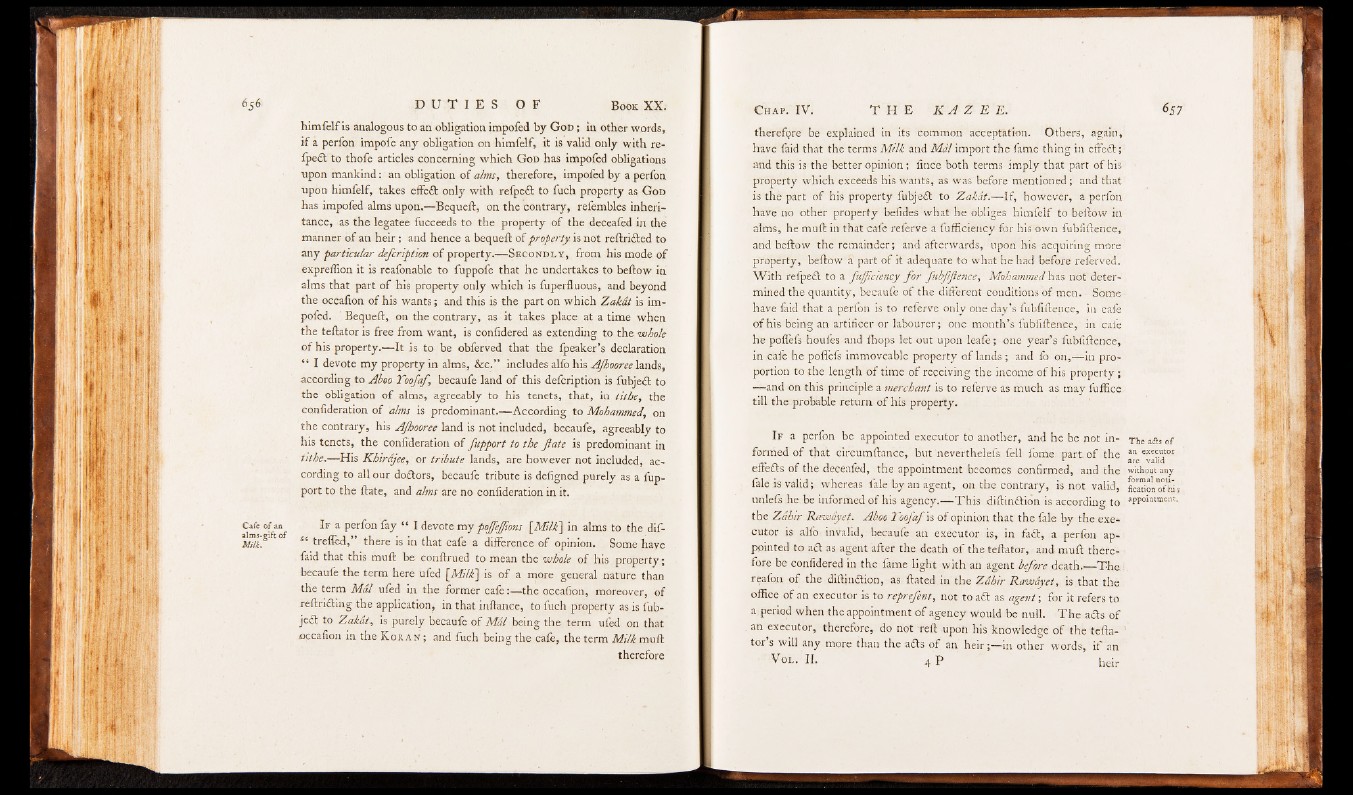
Cafe o f an
alms-gift o f
M ilk .
himfelf is analogous to an obligation impofed by G o d ; in other words,
i f a perfon impofe any obligation on himfelf, it is valid only with re-
fpedt to thofe articles concerning which G o d has impofed obligations
upon mankind: an obligation of alms, therefore, impofed by a perfon
upon himfelf, takes effedt only with refpedt to fuch property as G o d
has impofed alms upon.— Bequeft, on the contrary, refembles inheritance,
as the legatee fucceeds to the property of the deceafed in the
manner of an heir; and hence a bequeft of property, is not reftridted to
any particular defcription of property.— S e c o n d l y , from his mode of
expreffion it is reafonable to fuppofe that he undertakes to beftow in
alms that part of his property only which is fuperfluous, and beyond
the occafion of his wants; and this is the part on which Zakdt is impofed.
Bequeft, on the contrary, as it takes place at a time when
the teftator is free from want, is confidered as extending to the whole
o f his property.— It is to be obferved that the fpeaker’s declaration
“ I devote my property in akns, &c.” includes alfo his Afhooree lands,
according to Aboo Toofcf, becaufe land of this defcription is fubjedt to
the obligation of alms, agreeably to his tenets, that, in tithe, the
confideration of alms is predominant.— According to Mohammed, on
the contrary, his AJhooree land is not included, becaufe, agreeably to
his tgnets, the confideration of fupport to the fa te is predominant in
tithe.— His Khirdjee, or tribute lands, are however not included, according
to all our dodtors, becaufe tribute is defigned purely as a fupport
to the ftate, and alms are no confideration in it.
If a perfon fay “ I devote my poffeffions [Milk] in alms to the dif-
“ trefled,” there is in that cafe a difference of opinion. Some have
faid that this muft be conftrued to mean the whole of his property;
becaufe the term here ufed [Milk] is of a more general nature than
the term Mai ufed in the former cafe:—the occafion, moreover, of
reftridting the application, in that inftance, to fuch property as is fub-
jedt to Zakdt, is purely becaufe of Mdl being the term ufed on that
occafion in the K o r a n ; and fuch being the cafe, the term Milk muft
therefore
therefijre be explained in its common acceptation. Others, again,
have faid that the terms Milk and Mdl import the fame thing in effedt;
and this is the better opinion; finc'e both terms imply that part of his
property which exceeds his wants, as wa^be'fore mentioned; and that
is the part of his property fubjedt to Zakdt.— If, however, a perfon
have no other property befides what he obliges himfelf to beftow in
alms, he muft in that cafe referve a fufficiency for his'Own fubfifterice,
and beftow the remainder; and afterwards, upon his acquiring more
property, beftow a part of it adequate to what he had before referved.
With refpedt to a fufficiency fo r fubfflence, Mohammed has not determined
the quantity, becaufe of the different conditions of men. ■ Some
have (aid that a perfon is to referve only one day’s fubfiftence, in cafe
of his being an artificer or labourer; one month’s: fubfiftence, in cafe
he poflefs houfes and Ihops let out upon leafe; one year’s fubfiftence,
in cafe he poflefs immoveable property of lands ; and fo on,— in proportion
to the length of time of receiving the income of his property ;
— and on this principle a merchant is to referve as much as. may lufflce
till the probable return of his property.
If a perfon be appointed executor to another, and he be jiot informed
of that circumftance, but neverthelefs. fell forne part, of the
effedts of the deceafed, the appointment becomes-confirmed, and the
fale is valid; whereas. fale by an agent, on the contrary, is not valid,
unlefs he be informed of his agency.— This diftindtion is according, to
the Zahir Raivayet. Aboo Toofaf Is of opinion that the fale by the executor
is alfo. invalid, becaufe an executor is, in fadt, a perfon appointed
to adt as agent after the death of the teftator, and muft therefore
be confidered in the fame light with an agent before death.— The.
reafon of the diftindlion, as ftated in the Zdbir Rawdyet, is that the
office of an executor is to reprefent, not to adt as agent; for it refers to
a period when-the appointment of agency would be null. T h e ads of
an executor, therefore, do not'reft upon his^ knowledge of the tefta-
tor’ s will any more than the adts o f an heir;— in other words, i f an
V ol. II. 4 p heir
T h e a£s o f
an executor
are valid
without any
formal notification
o f hi s
appointment.